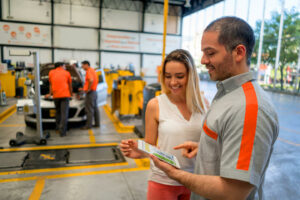Platte Valley Auto makes car buying and service easy, serving Lexington, NE, with trusted solutions.
Lexington, NE, January 22, 2025 / LinkDaddy News / – Platte Valley Auto has long been the trusted name for vehicle sales, service, and financing in Lexington, Nebraska. Dedicated to providing exceptional customer experiences, the dealership offers a wide selection of new Ford, Chevrolet, RAM, and Jeep vehicles, as well as high-quality used cars. From hassle-free trade-ins to convenient online tools for purchasing and service scheduling, Platte Valley Auto has streamlined the process of car ownership for the modern customer.
With an unwavering commitment to customer satisfaction, Platte Valley Auto caters to all aspects of automotive needs, from vehicle purchases and financing to maintenance and parts. Whether you’re looking for a rugged RAM truck, a versatile Jeep SUV, or a reliable used car, the dealership ensures you’ll find the perfect vehicle for your lifestyle and budget.
Platte Valley Auto understands that convenience is key when it comes to buying a car, which is why they’ve embraced technology to make the process as seamless as possible. Customers can calculate payments, estimate trade-in values, and even apply for financing—all from the comfort of their own homes. The dealership’s user-friendly website is designed to save time and eliminate stress, giving buyers the freedom to explore their options at their own pace.
In addition to its online capabilities, Platte Valley Auto prides itself on its friendly and knowledgeable sales team. Staff members work closely with customers to understand their needs and guide them to the best options available, ensuring a tailored and stress-free shopping experience.
 Platte Valley Auto boasts an impressive inventory of new vehicles from trusted brands like Ford, Chevrolet, RAM, and Jeep. Whether you’re in the market for a powerful truck, a family-friendly SUV, or a fuel-efficient car, the dealership offers something for everyone. For those seeking more budget-friendly options, Platte Valley Auto also features a wide selection of reliable pre-owned vehicles that have been thoroughly inspected for quality and performance.
Platte Valley Auto boasts an impressive inventory of new vehicles from trusted brands like Ford, Chevrolet, RAM, and Jeep. Whether you’re in the market for a powerful truck, a family-friendly SUV, or a fuel-efficient car, the dealership offers something for everyone. For those seeking more budget-friendly options, Platte Valley Auto also features a wide selection of reliable pre-owned vehicles that have been thoroughly inspected for quality and performance.
The dealership’s competitive specials make it even easier to save big on your next vehicle. With regular promotions and financing offers, Platte Valley Auto ensures you get the most value for your money.
Owning a vehicle is about more than just the purchase—it’s also about keeping it in top condition. Platte Valley Auto’s service center is equipped with state-of-the-art technology and staffed by certified technicians who are dedicated to keeping your car running smoothly. From routine maintenance like oil changes and tire rotations to more complex repairs, the dealership offers a full range of services to meet your needs.
 What sets Platte Valley Auto apart is its commitment to convenience. Customers can schedule service appointments online, making it easy to book a time that works for their busy schedules. The dealership also offers a wide selection of genuine auto parts for those who prefer to handle repairs and maintenance on their own.
What sets Platte Valley Auto apart is its commitment to convenience. Customers can schedule service appointments online, making it easy to book a time that works for their busy schedules. The dealership also offers a wide selection of genuine auto parts for those who prefer to handle repairs and maintenance on their own.
Platte Valley Auto recognizes that financing can be one of the most stressful parts of buying a car, which is why they’ve simplified the process to make it as straightforward as possible. Their professional finance team works closely with customers to design payment plans that fit their lifestyle and budget.
Whether you have excellent credit or are working to rebuild your financial standing, Platte Valley Auto partners with a variety of lenders to find the best options for your situation. The dealership also offers tools to pre-qualify for financing and calculate monthly payments online, giving customers peace of mind before they even step onto the lot.
About Platte Valley Auto
Platte Valley Auto, located in Lexington, NE, is a trusted car dealership offering a wide range of new and used vehicles from leading brands like Ford, Chevrolet, RAM, and Jeep. With a strong focus on customer satisfaction, the dealership provides convenient online tools for vehicle purchases, trade-ins, and financing, as well as comprehensive maintenance and repair services. Fully committed to making car ownership stress-free and enjoyable, Platte Valley Auto is your one-stop destination for all your automotive needs.
Visit https://www.plattevalleyauto.com/ for more information.
Media Contact:
Company Name: Platte Valley Auto
Address: Lexington, NE
Phone: (308) 324-5619

